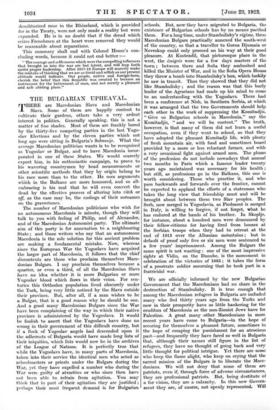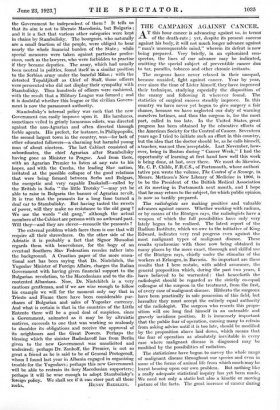THE BULGARIAN UPHEAVAL.
THERE are Macedonian Slays and Macedonian Slays. Some of them are happily content to cultivate their gardens, others take a very ardent interest in politics. Generally speaking, this is not a matter of fine shades. Most of them are frankly bored by the thirty-five competing parties in the last Yugo- slav Elections and by the eleven parties which not long ago were sitting in Bulgaria's Sobranje. What the average Macedonian politician wants is to be recognized as Yugoslav or Bulgar, and to have Macedonia incor- porated in one of these States. We would scarcely expect him, in his enthusiastic campaign, to prove to his wavering countrymen by head measurements or other scientific methods that they by origin belong to his race more than to the other. He uses arguments which in the Balkans are more honoured, and so all- embracing is his zeal that he will even convert the dead by the effective process of altering into vitch or off, as the case may be, the endings of their surnames on the gravestones.
The number of Macedonian politicians who wish for an autonomous Macedonia is minute, though they will talk to you with feeling of Philip, and of Alexander, and of the Macedonian Autonomist party. The ultimate aim of this party is for annexation to a neighbouring State ; and those writers who say that an autonomous Macedonia is the sole solution for this ancient problem are making a fundamental mistake. Now, whereas since the European War the Yugoslays have acquired the larger part of Macedonia, it follows that the chief discontents are those who proclaim themselves Mace- donian Bulgars. I say proclaim themselves because a quarter, or even a third, of all the Macedonian Slays have no idea whether it is more Bulgarian or more Yugoslav blood which flows in their veins. For cen- turies this Orthodox population lived obscurely under the Turk, being very little noticed by the Slays outside their province. But, after all, if a man wishes to be a Bulgar, that is a good reason why he should be one. And a good many Macedonian Bulgars since the War have been complaining of the way in which their native province is administered by the Yugoslays. It would be foolish to assert that the Yugoslays have done no wrong in their government of this difficult country, but if a flock of Yugoslav angels had descended upon it the adherents of Bulgaria would have made long lists of their iniquities, which lists would now be in the archives of the League of Nations. It is perfectly true that while the Yugoslays have, in many parts of Macedonia, taken into their service the identical men who acted as schoolmasters or priests under the Bulgars during the War, yet they have expelled a number who during the War were guilty of atrocities or who since then have not been able to, refrain from agitation. You may think that in part of their agitation they are justified ; perhaps their most frequent demand is for Bulgarian schools. But, now they have migrated to Bulgaria, the existence of Bulgarian schools has by no means pacified them. For a long time, under Stambulisky's regime, these Macedonian Bulgars practically annexed the south-west of the country, so that a traveller to Gorna Djumaia, or Nevrokop could only proceed on his way at their good pleasure. At Kustendil, that picturesque place in the west, the emigres were for a few days masters of the town ; between there and Sofia they ambushed and killed the Minister of War, and in the Sofia Opera House they threw a bomb into Stambulisky's box, which luckily he saw in transit. Thus they showed that they did not like Stambulisky ; and the reason was that this burly leader of the Agrarians had made up his mind to come to an understanding with the Yugoslays. There had been a conference at Nish, in Southern Serbia, at which it was arranged that the two Governments should help each other in the work of suppressing the Komitadjis. " Give us Bulgarian schools in Macedonia," say the Komitadjis, " and we will be content." The truth, however, is that many of them did not learn a useful occupation, even if they went to school, so that they have adopted the pleasant Komitadji life, with plenty of fresh mountain air, with food and sometimes board provided by a more or less reluctant farmer, and with a very occasional fight against armed men. The plums of the profession do not include nowadays that annual two months in Paris which a famous leader twenty years ago maintained was necessary for his health ; but still, as professions go in the Balkans, this one is worth considering. Those who practise it, and who pass backwards and forwards over the frontier, cannot be expected to applaud the efforts of a statesman who takes the long view that friendship must and will be brought about between these two Slav peoples. The Serb, now merged in Yugoslavia, as Piedmont is merged in Italy, is willing to forgive, if not 'forget, what he has endured at the hands of his brother. In Skopije, for instance, about a hundred men were denounced by their fellow-citizens for having fired from houses at the Serbian troops when they had to retreat at the end of 1915 over the Albanian mountains ; but in default of proof only five or six men were sentenced to a few years' imprisonment. Among the Bulgars the same spirit is not wanting : one of the most impressive sights at Vidin, on the Danube, is the monument in celebration of the victories of 1885 ; it takes the form of a prostrate soldier mourning that he took part in a fratricidal war.
We are officially informed by the new Bulgarian Government that the Macedonians had no share in the destruction of Stambulisky. It is true enough that among the Macedonian refugees in Bulgaria are included many who fled thirty years ago from the Turks and now in their prosperity have as little hankering for the crudities of Macedonia as the non-Zionist Jews have for Palestine. A great many 'other Macedonians in more recent years have come to Bulgaria—in the hope of securing for themselves a pleasant future, sometimes in the hope of escaping the punishment for an atrocious past—and frequently they have fared so well in Bulgaria that, although their names .still figure in the list of refugees, they have no thought of going back and very little thought for political intrigue. Yet there are some who keep the flame alight, who keep on crying that the sacred mission of the Bulgars is to liberate the Mace- donians. We will not deny that some of them are patriots, even if, through force of adverse circumstances, they are professional patriots. But, being destitute of a far vision, they are a calamity. In this new Govern- ment they are, of course, not openly represented. Will the Government be independent of them ? It tells us that its aim is not to liberate Macedonia, but Bulgaria ; and it is a fact that various other categories were kept in chains by Stambulisky. The bourgeois, who naturally are a small fraction of the people, were obliged to bear nearly the whole financial burden of the State ; while special measures were taken against particular profes- sions, such as the lawyers, who were forbidden to practise if they became deputies. The army, which had usually been neutral in politics, found itself in a similar position to the Serbian army under the baneful Milan ; with the detested Topaldjikoff as Chief of Staff, those officers were persecuted who did not display their sympathy with Stambulisky. Thus hundreds. of officers were cashiered, with the result that a Military League was formed ; and it is doubtful whether this league or the civilian Govern- ment is now the paramount authority.
Stambulisky's internal policy was such that the new Government can easily improve upon it. His harshness, sometimes veiled in grimly humorous edicts, was directed against the non-Agrarian and often directed through feeble agents. His prefect, for instance, in Philippopolis, the second largest town in the country, was—for lack of other educated followers—a charming but harmful young man of about nineteen. The last Cabinet consisted of subordinates, the chief Agrarian after Stambulisky having gone as Minister to Prague. And from there, with an Agrarian Premier to listen at any rate to his hopes, and with the Czechs, the leading Slav nation, irritated at the possible collapse of the good relations that were being formed between Serbs and Bulgars, the energetic and very capable Daskaloff—called by the British in Sofia " the little Trotsky "—may yet be able to raise in Bulgaria the banner of Agrarian revolt. It is true that the peasants for a long time turned a deaf ear to Stambulisky. But having tasted the sweets of power, will they make no resistance to the old gang ? We use the words " old gang," although the actual members of the Cabinet are persons with no awkward past. Will they—and they are clever—reconcile the peasants ?
The external problem which faces them is one that will require all their shrewdness. On the other side of the Adriatic it is probably a fact that Signor Mussolini regards them with benevolence, for the bogy of an eventual Southern Slav Federation recedes rather into the background. A Croatian paper of the more sensa- tional sort has been saying that Dr. Nintchitch, the Yugoslav Minister of Foreign Affairs, charges the Italian Government with having given financial support to the Bulgarian revolution, to the Macedonians and to the dis- contented Albanians. Now, Dr. Nintchitch is a very cautious gentleman, and if we are wise enough to follow his example we will for the moment only say that in Trieste and Fiume there have been considerable pur- chases of Bulgarian and sales of Yugoslav currency. And what is certain is that in the countries of the Little Entente there will be a good deal of suspicion, since -a Government, animated as it may be by altruistic motives, succeeds to one that was working so zealously to shoulder its obligations and receive the approval of its neighbours and the Great Powers. Perhaps the blessing which the sinister Radoslavoff has from Berlin given to the new Government was unsolicited and undesired; perhaps Dr. Zankoff, the Premier, is not so great a friend as he is said to be of General Protogeroff, whom I found last year in Albania engaged in organizing trouble for the Yugoslays ; perhaps this new Government will be able to restrain its fiery Macedonian supporters; perhaps it will be wise enough to adopt Stambulisky's foreign policy. We shall see if it can steer past all these











































 Previous page
Previous page